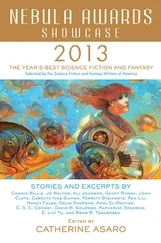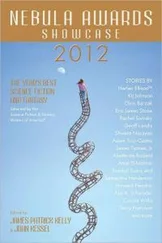Her heart skips a beat when she hears the scraping, somewhere beneath her, somewhere within the mist: a grinding, scouring sort of noise, steady as her nerves aren’t, because something is climbing the glass hill and this isn’t how it was supposed to work, no one is supposed to be able to reach her, but magic is magic is magic and there is always stronger magic—She thinks it is a bear, at first, then sees it is a furred hood, glimpses a pale delicate chin beneath it, a wide mouth twisted into a teeth-gritting snarl from the effort of the climb.
Amira stares, uncertain, as the hooded, horseless stranger reaches the top, and stops, and stoops, and pants, and sheds the warm weight of the fur. Amira sees a woman, and the woman sees her, and the woman looks like a feather and a sword and very, very hungry.
Amira offers up her golden apple without a word.
* * *
Tabitha had thought the woman in front of her a statue, a copper ornament, an idol, until her arm moved. Some part of her feels she should pause before accepting food from a magical woman on a glass hill, but it’s dwarfed by a ravenousness she’s not felt in weeks; in the shoes, she mostly forgets about her stomach until weakness threatens to prevent her from putting one foot in front of the other.
The apple doesn’t look like food, but she bites into it, and the skin breaks like burnt sugar, the flesh drips clear, sweet juice. She eats it, core and all, before looking at the woman on the throne again and saying—with a gruffness she does not feel or intend—“Thank you.”
“My name is Amira,” says the woman, and Tabitha marvels at how she speaks without moving any other part of her body, how measured are the mechanics of her mouth. “Have you come to marry me?”
Tabitha stares. She wipes the juice from her chin, as if that could erase the golden apple from her belly. “Do I have to?”
Amira blinks. “No. Only—that’s why people try to climb the hill, you know.”
“Oh. No, I just—” Tabitha coughs, slightly, embarrassed. “I’m just passing through.”
Silence.
“The mist was thick, I got turned around—”
“You climbed”—Amira’s voice is very quiet—“a glass hill”—and even—“by accident?”
Tabitha fidgets with the hem of her shirt.
“Well,” says Amira, “it’s nice to meet you, ah—”
“Tabitha.”
“Yes. Very nice to meet you, Tabitha.”
Further silence. Tabitha chews her bottom lip while looking down into the darkness at the base of the hill. Then, quietly: “Why are you even up here?”
Amira looks at her coolly. “By accident.”
Tabitha snorts. “I see. Very well. Look.” Tabitha points to her iron-strapped feet. “I have to wear the shoes down. They’re magic. I have a notion that the stranger the surface—the harder it would be to walk on something usually—the faster the sole diminishes. So your magical hill here…”
Amira nods, or at least it seems to Tabitha that she nods—it may have been more of a lengthened blink that conveyed the impression of her head’s movement.
“… it seemed like just the thing. I didn’t know there was anyone at the top, though; I waited until the men at the bottom had left, as they seemed a nasty lot—”
It isn’t that Amira shivers, but that the quality of her stillness grows denser. Tabitha feels something like alarm beginning a dull ring in her belly.
“They leave as the nights turn colder. You’re more than welcome to stay,” says Amira, in tones of deepest courtesy, “and scrape your shoes against the glass.”
Tabitha nods, and stays, because somewhere within the measured music of Amira’s words she hears please .
* * *
Amira feels half-asleep, sitting and speaking with someone who isn’t about to destroy her, break her apart for the half kingdom inside.
“Have they placed you up here?” Tabitha asks, and Amira finds it strange to hear anger that isn’t directed at her, anger that seems at her service.
“No,” she says softly. “I chose this.” Then, before Tabitha can say anything else, “Why do you walk in iron shoes?”
Tabitha’s mouth is open but her words are stopped up, and Amira can see them changing direction like a flock of starlings in her throat. She decides to change the subject.
“Have you ever heard the sound geese make when they fly overhead? I don’t mean the honking, everyone hears that, but—their wings. Have you ever heard the sound of their wings?”
Tabitha smiles a little. “Like thunder, when they take off from a river.”
“What? Oh.” A pause; Amira has never seen a river. “No—it’s nothing like that when they fly above you. It’s… a creaking, like a stove door with no squeak in it, as if the geese are machines dressed in flesh and feathers. It’s a beautiful sound—beneath the honking it’s a low drone, but if they’re flying quietly, it’s like… clothing, somehow, like if you listened just right, you might find yourself wearing wings.”
Without noticing, Amira had closed her eyes while speaking of the geese; she opens them to see Tabitha looking at her with curious focus, and feels briefly disoriented by the scrutiny. She isn’t used to being listened to.
“If we’re lucky,” she says softly, turning a golden apple around and around in her hands, “we’ll hear some tonight. It’s the right time of year.”
* * *
Tabitha opens her mouth, then shuts it so hard her back teeth meet. She does not ask how long have you been sitting here, that you know when to expect the geese ; she does not ask where did that golden apple come from? Didn’t I just eat it? She understands what Amira is doing and is grateful; she does not want to talk about the shoes.
“I’ve never heard that sound,” she says instead, slowly, trying not to look at the apple. “But I’ve seen them on rivers and lakes. Hundreds at a time, clamoring like old wives at a well, until something startles them into rising, and then it’s like drums, or thunder, or a storm of winds through branches. An enormous sound, almost deafening—not one to listen closely for.”
“I would love to hear that,” Amira whispers, looking out toward the woods. “To see them. What do they look like?”
“Thick, dark—” Tabitha reaches for words. “Like the river itself is rising, lifting its skirts and taking off.”
Amira smiles, and Tabitha feels a tangled warmth in her chest at the thought of having given her something.
* * *
“Would you like another apple?” offers Amira, and notes the wariness in Tabitha’s eye. “They keep coming back. I eat them myself from time to time. I wasn’t sure if—I thought it was meant as a prize for whoever climbed the hill, but I suppose the notion is they don’t go away unless I give them to a man.”
Tabitha frowns, but accepts. As she eats, Amira feels Tabitha’s eyes on her empty hands, waiting to catch the apple’s reappearance, and tries not to smile— she’d done as much herself the first fifty or so times, testing the magic for loopholes. Novel, however, to watch someone watching for the apple.
As Tabitha nears the last bite, Amira sees her look confused, distracted, as if by a hair on her tongue or an unfamiliar smell—and then the apple’s in Amira’s hand again, feeling for all the world like it never left.
“I don’t think the magic lets us see it happen,” says Amira, almost by way of apology for Tabitha’s evident disappointment. “But so long as I sit here, I have one.”
“I’d like to try that again,” says Tabitha, and Amira smiles.
* * *
First, Tabitha waits. She counts the seconds, watching Amira’s empty hands. After seven hundred seconds, there is an apple in Amira’s hand. Amira stares at it, looking from it to the one in Tabitha’s.
Читать дальше
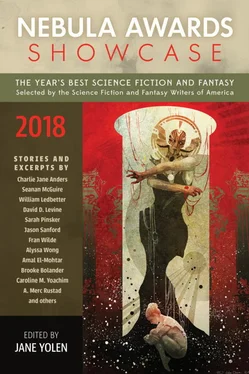
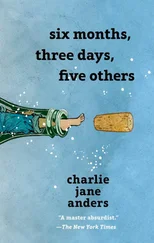


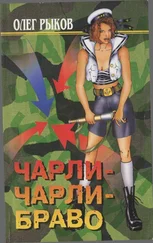
![Картер Браун - Том 11. Меня прислал Чарли [ Меня прислал Чарли. Близорукая русалка. Пираты из Гонконга. Убийственный кайф]](/books/103873/karter-braun-tom-11-menya-prislal-charli-menya-pri-thumb.webp)
